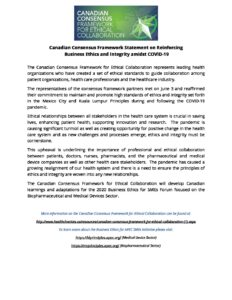Complaints must be submitted in writing and sent to Innovative Medicines Canada by mail or email to the addresses below for tracking purposes. Verbal, telephone or fax complaints will not be accepted. All complaints should be addressed to:
Attention: Industry Practices Review Committee c/o Executive Director, Ethics, Legal and Regulatory, Innovative Medicines Canada, 55 rue Metcalfe Street, Suite 1220, Ottawa, ON K1P 6L5 You may also send your complaints to the following email address: complaint@imc-mnc.ca
Complaints must specify the Innovative Medicines Canada member company against which the complaint is being made. Complainants are advised that the Code of Ethical Practices applies to Innovative Medicines Canada members. It does not apply to generic drug companies, or to innovative pharmaceutical companies that are not members of Innovative Medicines Canada. A list of member companies is available on Innovative Medicines Canada’s website at: http://innovativemedicines.ca/about/member-companies/
Complainant Identity and Contact Information. Each complainant must identify him or herself, and any company/organization/association with which they are affiliated. Full return address and contact information must also be provided. Anonymous complaints or complaints with inadequate complainant contact information will not be considered. Unless the complainant has identified him or herself to the member company that is the subject of the complaint, Innovative Medicines Canada will not identify the complainant to the member company during the investigation and adjudication process. Member companies that are complainants are encouraged to identify themselves. However, complainants are hereby notified that in the event that a Code complaint decision of the Industry Practices Review Committee (IPRC) is appealed (by either the complainant or the member company, and unless the complainant chooses to discontinue the complaint upon appeal by the member company), the complainant’s identity will be disclosed, and the complainant will be required to participate in the arbitration process.
Complainants must set out in writing as much specific information as possible (who/what/when/where) regarding their complaint. Evidence in the form of documentation and/or photographs is permissible, but complainants are advised that Innovative Medicines Canada may not return any materials submitted. Complainants are advised that the provision of timely, clear and accurate information will greatly assist in the processing of the complaint. Complaints regarding potential Code breaches that are determined to have occurred more than one hundred and twenty (120) days after the event(s) giving rise to the complaint(s) became known to, or reasonably ought to have been known to, the complainant, will not be considered by the IPRC.
If possible, complainants should set out what section(s) of the Code of Ethical Practices the complainant believes has been violated. Correct references to the Code will facilitate the processing of a complaint.
Before the complaint is formally reviewed by the IPRC and without prejudice to the complaint, Innovative Medicines Canada will attempt to engage the disputing parties in an initial exchange of information. This normally involves Innovative Medicines Canada seeking a timely written response to the complaint by the Member that is subject to the complaint. Subject to the Member’s agreement, this response will be shared with the complainant. If the complainant wishes to withdraw the complaint, the complaint process is terminated at this point. A letter confirming that the file has been closed will be sent from Innovative Medicines Canada to both parties. Otherwise, Innovative Medicines Canada will refer the complaint file to the IPRC for adjudication.
Complainants should also be aware that in order to process and adjudicate the complaint, follow-up enquiries from Innovative Medicines Canada may be required. Failure to respond to such enquiries may result in the discontinuation of the complaint process.
Complaints regarding member company advertising issues should not be directed to Innovative Medicines Canada, but rather should be directed to the Pharmaceutical Advertising Advisory Board (PAAB) at:
Pharmaceutical Advertising Advisory Board
300 – 1305 Pickering Parkway
Pickering, ON
LIV 3P2
Complainants may submit complaints in accordance with these requirements in English or in French.
The Code of Ethical Practices sets out various timeframes for the processing and adjudication of complaints. While the IPRC and Innovative Medicines Canada staff attempt to adhere to these timeframes wherever reasonably possible, logistics and other commitments of the volunteer members may preclude strict compliance. In an effort to minimize possible scheduling conflicts between the members, the IPRC will pre-schedule at least four (4) meetings throughout the year. The IPRC and Innovative Medicines Canada staff will attempt to ensure that any delays do not unduly prejudice either party to a complaint.
Innovative Medicines Canada wishes to ensure that all complaints submitted in accordance with this process have been filed by the complainant in good faith. Innovative Medicines Canada reserves the right to reject complaints that are determined to be frivolous, vexatious, and abusive to Innovative Medicines Canada and/or its member companies, moot, or otherwise made in bad faith.
Innovative Medicines Canada encourages transparency, especially in relation to its Code of Ethical Practices. To that end, a record of all Code-related complaints (i.e., the number of complaints lodged, withdrawn, rejected or adjudicated) will be made available on the Members’ website. Only on the occasions where the IPRC determines an infraction will the Member’s name be published on the Members’ website.
NOTE: In the event that any of the following complaint requirements are not followed, complainants are advised that Innovative Medicines Canada reserves the right to reject their complaint without further notice










